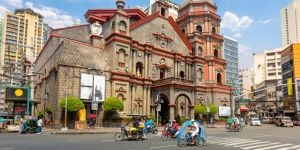Student life in the Philippines
Hello,
Studying in a foreign country is an exciting prospect, but at times students do not have enough information to make an informed decision. We invite you to share your own experiences about studying abroad in the Philippines.
What are the advantages of studying in the Philippines? What are the disadvantages?
Are there proper housing options for students, or do most students have to find their own accommodation?
Are living costs for students in the Philippines expensive? What is an average budget for a student per month, including rent, groceries, and social activities?
Is it easy to form a social circle in the Philippines? What are some of the preferred social activities?
Are there international student societies or community engagement programs for international students?
Thank you for sharing your experience.
Priscilla
If someone want to study abroad please choose some other country, not Philippines. Philippines have many pros, but education is not one of it. It is simply terrible. When I talk with many of them, they do know where is my country Croatia, even where is Europe. Teachers think Europe and Africa are COUNTRIES. They think Melbourne is capital of Australia! One day I asked probably 50 Filipinos, what is closer to the Philippines - moon or Chicago. Believe me, 45 of them told me it is a moon. Because they can see the moon, but they cannot see Chicago. It is general knowledge and all need to know that Chicago is closer to the Philippines than moon, or Europe is continent, not a country! They learning in schools only how to pray and how to dance. No difference between public schools and private. Unfortunately, not so many difference between people with high school and some college.
Hahaha ! When they told you the moon and not Chicago, I think they were laughing at you 
But it is true that they, like the American students, are not very good in geography.
As someone who has been living and studying in Philippines for past 7-8 years, I would it would all depend on your course and university. There certainly are few great universities here that provide good education. It all depends on what the student is looking for. Manila has a lot of expensive and renowned university but for someone on a tight budget I would recommend Cebu.
I agree with you. If you want to study marine science, for example, I recommend a lot of universities in the Philippines. So yes, it really depends of your course
In 2018, higher education institutions (HEIs) in the Philippines should be viewed with the inclusion of accredited on-line degrees. In my case, I considered completion of a PhD at AIIAS but have sense selected and been accepted to a 100% online/regionally accredited University from my home state of California. The factors I considered included:
- What accreditation body would be involved in a terminal degree from the Philippines vs. home state/country?
- Representation in international university rankings.
- What cost and time factors needed to be considered?
- Comparison of academic standards (i.e., plagiarism, and citation standards) in Philippines vs. home state/country.
- Transfer credits allowed for lower degrees earned.
- The pros and cons of brick & mortar vs online studies.
- Research library access and standings in Philippines vs. home state/country.
After a complete review of the above, it was clear that my best option was to attend the 100% online university in California where my DBA could be achieved in ~ 32 months.
Major factors:
- It was the very difficult to find a Philippine educational institute with global acceptance of it's credentials that fit my area of study and or need for independent studies.
- Finding a university approved for GI Bill approval (perhaps just an American concern).
- QS World University Rankings. Only 4: the University of the Philippines (367), Ateneo de Manila University (551-600), De La Salle University (701-750) and the University of Santo Tomas (801-1000).
Since The University of the Philippines, is the most prestigious university in the Philippines, it's current ranking at position 601-800 out of 1,102 institutions in the THE world ranking, sealed the decision for me to avoid study in the Philippines at this time.
I really avoid looking at international rankings ! It is a big business with an objective : celebrating the members of the big business  Like a snake eating its own tail
Like a snake eating its own tail 
But after that, yes it depends of your sector, your country etc. For example, many Koreans will go to the Philippines to learn English, even if the Filipino university is, Oh My God !, only 800e on an international ranking... they don't care at all. What they care is the quality of English learning and the cost of studies and the overall quality of life. Of course you can go in Cambridge or in Yale to learn English... a very good English indeed ! But also a huge bill to repay all along your life !
geolefrench wrote:Hahaha ! When they told you the moon and not Chicago, I think they were laughing at you

But it is true that they, like the American students, are not very good in geography.
....... Hi Frenchy, I am curious how you came to the conclusion that American students are not very good in geography? They managed to land on the moon and plant an American flag almost 50 years ago.
I was teaching in a Pensylvania colleges for 3 years in geosciences . I tested the first year in world geography just by curiosity... The results were catastrophics  . I talked about it with my American colleagues and they told me that the curriculum in geography was low level up to high school.
. I talked about it with my American colleagues and they told me that the curriculum in geography was low level up to high school.
I am talking about the average American students not about the high level engineers, researchers etc. Noting that many of the brightest are coming from abroad, attracted by the high salaries offered
No need to go into the story . I had a close friend come here to the University of Philippines
His treatment was a total disgrace with the lack of interest and lack of attention to detail.
He wasted a year on non sense and moved on. They are used to dealing with
the mass overpopulated Philippines He returned to the USA I was unset about
the entire process but did not want to waste my time on it. The school are
not set up for foreign students
A degree in the Philippines is not worth much in the west my granddaughter hires nurses for major hospitals Filipinos come with nursing degrees but are only qualified as nurse aid and must go back to school here in US a lot of lawyers from the Philippines go to the USA to get more degrees
Yes it is a protectionist measure from the US. Generally the Filipino nurses pass by the UK for 5 years without new schooling and then they go to the US. If they go back to school it is because they want to specialize .
Great response Scott - wish I'd thought of it firs
Jim Sweeney.
@ geolefrench, I wish to post a response meant to clarify a few of your points:
geolefrench wrote:Yes it is a protectionist measure from the US. Generally the Filipino nurses pass by the UK for 5 years without new schooling and then they go to the US. If they go back to school it is because they want to specialize .
Ref. "Filipino nurses pass by the UK for 5 years without new schooling" - I am totally unaware of any Nursing program in the Philippines that equals the requirements of the UK's Wound Ostomy Continence Certification Board (WOCNCB), as endorsed by the United Ostomy Associations of America's (UOAA) Ostomy and Continent Diversion Patient Bill of Rights. Please do provide such linkage as this would benefit the masses here in the PI.
Ref. "pass by the UK for 5 years without new schooling and then they go to the US" - There can be stories of how a select few RN's have made to the US and never tested ( this is highly unlikely in my view). If a person is interested in working in the USA as an RN, they must understand how to test and pass the NCLEX. The NCLEX (National Council Licensure Examination) is the only proper gate to pass thru to work in the USA as an RN, or to work abroad as an American licensed RN. Just research on the pay differences between an American RN vs. a Philippine RN's pay, as an OFW in the Middle East, if in doubt.
An observation I made in California is that many attempt this test and few pass it, first time. Once a person meets the criteria for NCLEX examination-eligibility, they must apply for a license from the state board of nursing and only then will they receive an Authorization to Take the Test (ATT).
I welcome any "protectionist" measures that result in the highest competency of the professional "Caregivers". It is my understanding that properly credentialed RN's wishing to take the NCLEX in the Philippines can do so via an appointment with such firms as "Pearson VUE"
Hi study in.philippines is cheeper then other contries.there is thousends of students are ztuday in philippines from diferent ountries.mostly ate study in dantestry.and as well as in other subjacts.its not really expansive to rent plce food tranportaion all is cheeper then other counries like i EU and australia usa etc.a student can spend a mobth in 400$ by all the means.
@ Cacababa,
It may be very hard to justify the outcome when a student puts price first. Both foreign and local students must consider what type of degree is going to help them professionally. Of course, cost is important to most students.
However, if the foreign student's long-term career goals, prerequisites or professional licensing requirements for his/her country (or the target post degree work country), are the results of a fully informed decision, elements like course content quality, school standing/reputation and the current global status are factors that are more important than cost. Good luck
Hi Calif native
I do not know the details but 10 of my nieces passed by the Uk first and then went to California, Guam, New Jersey and New York (Bronx) as nurses . They all told me that most of their colleagues nurses were from the Philippines and that without the Filipino nurses the hospitals in the US would collapsed ... along their activities they passed diffrent courses because they wanted to climb the ladder and improve their life, it is natural I think. But their diploma from the philippines were recognized by their employers as nurses not care givers.
To Calif Native, just a small statistics for your thoughts :
In 2013, 20% of all the registered nurses in California are from the Philippines.... It shows that the level of the Filipino nurses is not so bad after all, no ?
@ geolefrench,
It may be best if we stick to facts and not be anti or pro this country, person or people. I also have family in California that have been in nursing since 1965. If we put any opinions I may have aside and just look at official records we find the following:
Stats related to NCLEX and pass rates by schools:
- State of California: NCLEX Pass Rates https://www.rn.ca.gov/education/passrates.shtml
- 2018 - Number of Candidates Taking NCLEX Examination and Percent Passing, by Type of Candidate: https://www.ncsbn.org/Table_of_Pass_Rates.pdf
A summary of this pdf should bring this topic into focus with the following:
First Time, US Educated pass rates =
Diploma 90.12%
Baccalaureate Degree 91.73%
Associate Degree 86.99%
First Time, Internationally Educated pass rates =
Education not stated 41.16%
Internationally Educated retake pass rates =
Education not stated 22.53%
This is up for US educated and down for Internationally educated takers from the 2007 NCLEX findings of:
First Time, US Educated = 81.7% vs. Internationally Educated = 46.7%
Source: https://alinsuglaw.wordpress.com/2007/0 … -rate-467/
Based on your views, if the educational levels are equal, why are foreign educated nurses failing the 1st NCLEX , then 2nd, 3rd & 4th test retakes at rates well below the US Educated NCLEX takers?
So, even if the final numbers of Filipinos passing the NCLEX equal 20%, at what attrition rates did the 20% yield come from? Once answered, this should speak to the overall topic of educational/qualification differences by some countries. The above stats have zero to do with the intellect of any person from any country, but they do reflect the quality of education a person may receive compared to the US education for medical professionals.
Note: My use of the term "caregiver" relates to a trained professional such as a RN.
In addition to the above clear statistics, there are new policies that must be considered. I have no opinion to post here on if these policies are right/wrong or neutral. "In addition to passing the NCLEX in order to be able to work in the U.S., as of March 1, 2017, Filipino nurses applying for immigrant visas must either prove that they intend to marry a U.S. citizen within six months of their arrival in America or that they are already engaged to be married to a U.S. citizen".
Reported to be part of Trump's America First policy.
To be clear regarding any "anti-filipino" concerns you may have from posts on this topic. The US has a rich history and relationship with filipino nurses dating back to what was called the, "Pensionado Act of 1903". This is where Filipinos were sent to the US as government-funded scholars (pensionados) including those pursuing a nurse education. This is where the Philippine Nurses Association of New York (1928) was born. All Americans and Filipinos should be proud of these early Filipino pioneers.
We should be able to state facts and opinions here, without making attacks on our respective leaders, countries or each other. A statement that Americans fail in geography is paramount to some person making a global "prejudgement" type remark about all French people. I ask that you consider what your words mean prior to pressing the submit button.
Interesting statistics on nursing in the US, census 2010
https://www.migrationpolicy.org/article … d-states#4
"More than one-quarter of physicians and surgeons (27 percent) were foreign born, as were more than one out of every five (22 percent) persons working in health care support jobs as nursing, psychiatric, and home health aides."
In the US, 34% of foreign born nurses are coming from the Philippines (2010)
34% of foreign born physicians and surgeons are coming from India, Philippines, China (2010)
So it means that when you are in the US you have a big chance (1 out of 3) of being taken care by an Asian physician, nurse etc among them Filipino.
@geolefrench,
Ref. "I have finished with this topic, sorry if I have hurt your big ego."
Perhaps one should understand the of signs egotistical types prior to pointing toward others.
Ref. "you were saying something like nursing schools in the Philippines are not good because."
Reread what I posted. Of course the nursing differences between any country exist where customs, traditions and economics vary. The laws that govern nursing in the Philippines are also quite different.
In the PI: IV therapy is not considered a nursing role and RN's need post-graduate training to practice IV therapy.
In the US: IV therapy is critical in the nursing role and is part of the curriculum that will be tested in the NCLEX.
It is logical that when a person wants to work in the USA an an RN, they must meet the US requirements. If not, they must update their education.
Ref. "You forgot that ALL foreign nurses who apply for the US have to pass this exam to be registered."
If the focus is on the Philippines and schools in the Philippines, you forgot that: The top Nursing School in Philippines: https://www.healthcarestudies.com/Assoc … on-System/
"This school offers programs in: English"
Again, I encourage you to reduce the tendency to make personal attacks, just relax and enjoy all contributions to this topic.
Hello everyone,
Please note that several posts have been put aside from this thread. I would request that you no longer compare studies in the Philippines to any other specific country. The aim of the thread is not to compare but to help out members (from all over the world) who might be considering to study in the Philippines.
Thank you in advance,
Bhavna
In philippines i have seen a lot of international students studying here...its cheap and main thing that they seek education nd they adopt their calm filipino status not like other countries like west...so if you want to educate your son daughter or yourself then philippine is not a bad choice..
It is unproductive, as the moderator has indicated, to engage in the kind of us vs them banter promulgated here. Or any where. Sad, that geolefrench seems to believe that the Philippines need to be compared to the U.S. when it is the U.S. that has had the greatest influence over the Philippine educational system. Neither approach offers answers to the questions.
Here’s some background. Education around the world continues to change. The concept should not be talked about as if it is static. Technology has pushed education, too often kicking and screaming, into innovation and responding to employer demands. The question all who enter post secondary education, anywhere, need to ask is will the institution I am attending give me the skills the workforce needs where I seek to work? As many Filipinos seek work outside their home country the last part of this question is even more critical requiring, potentially lots of homework.
As the Philippines has moved to k -12, the challenge is how the university system will respond. The Philippines offers low cost practional training. And many foreigners come for this practitioners focused education and training. It’s kind of like community colleges in the U.S. There is a pitfall, though. What is sold as professional degrees typically are not. Engineers do not receive the skills needed to problem solve, in most cases. They are does, techs. The same is true for chefs, hospitality, teachers and even nurses. These degree programs do not put students even close to the top of the education and training ladder for their professions. I say this with no bias, except don’t promise what cant’t be delivered. The world needs doers, skilled crafts people. I wish Philippine higher education institutions wouldvown this space instead of branding it as something it is not.
The realization that technology has widened the gap between the skills universities give and the skills workers need should be prominent in the minds of potential students. Especially in health care. The problem is that, in the Philippines, there is no quality control,agency over looking higher education in the Philippines. The HED is a regulatory body. I will not touch charges of corruption and greed. I will say that standards vary greatly. And that for profit education and training has a major foothold in the country. Students are impacted adversely by the absence of continuity and vision in career preparation. Anyone thinking of studying in the Philippines needs to ask some hard questions of the places where they are investing their money.
Finally, English proficiency is a growing problem in the Philippines. Especially among the lower socioeconomic classes. Public school teachers pass on bad habits and grammatical errors. And too many people discourage others from practicing a language that is essential to their career success outside of the Philippines. https://www.philstar.com/world/2017/09/ … glish-test
Most Philippine universities rely on private housing, which students have to find and navigate themselves. What is nice, I am told, it is pretty easy to find people who will help. Student services do not exist in most Philippines universities. Help comes from an interested faculty member, as opposed to a counseling or advising center. The attitude seems to be more sink or swim. A student success model for assessing institution effectiveness is sketchy. As are school calendars!
Thus the question might be asked, what does a potential student expect? What has been their experience? What do they need?
In case anyone wonders or cares, my background lies in higher education (US).
Wayne
ElGatoNegron wrote:Finally, English proficiency is a growing problem in the Philippines.
That's something tech is about to solve.
I tried out a universal translator in a local bookshop yesterday and it was pretty good, even coping with a Yorkshire accent.
The education industry isn't even thinking about translator tech at the moment, but they're going to have to, and soon. I believe your assessment of the general level of English in your local schools is roughly correct (based on talking to a lot of your teachers here, and nurses in the UK, but that's likely to become inconsequential within a very few years.
I have lived here for 8 yrs. Back and forth from the US 13 yrs. Had a child here and spoke 2 my business partners and friends. The business community all mostly agree get out of the PH and go 2 the US if u want a quality school. IF u cannot afford it then the University of PH in Manila not Davao. All university's r much more advanced in Manila than other parts of PH. Stay away from all these trade schools that promise the world, thy r a waste of money.
if i was studying on a geography course then knowing about different countries and continents and distances may be essential but i would not judge an educational system on that criteria. many people in the USA would not now the answers to geographic questions but that does not make their education system bad. many people would love to study at Harvard.
Excellent Posts. Being from the United States, I am interested in taking a few classes at a university in the Philippines. I am a soon retired business owner with having done some college in the US and would like to possibility complete a degree in the Philippines. Do most universities there accept older foreign transfer students? What experiences do you have in the process of getting enrolled in a Philippine university? I am not in any hurry so i was planning to stop by the University of Cebu and other universities when i travel there in a month or so to choose a university and begin the process of applying. What were your experiences for obtaining accommodations while studying? From reading the posts, i assume there is no such thing as online studies at any Philippines university. Thank you for any responses.
Make your relocation easier with the Philippines expat guide

Lifestyle in the Philippines
About to move to the Philippines? Wondering how you're going to adapt to your new environment and lifestyle? ...

Developing your social circle in Manila
When moving to a new city, invariably, the friends you meet and cultivate first will make the most impact and can ...

Leisure activities in the Philippines
Consisting of more than 7,000 islands, the Philippines is a real treasure that you can explore during your stay ...

Diversity and inclusion in the Philippines
The culture of the Philippines is very diverse. This is due to the large mix of different nations in this country, ...

Accommodation in Iloilo
Iloilo, nicknamed the 'Heart of the Philippines', is a province stretching over 4,663 km² in the ...

Tax in the Philippines
When moving to the Philippines, especially if you are going to work or set up a business there, you will probably ...

Obtaining a Philippines driving licence
Whether you are converting your existing foreign driving license or applying as a first-timer for a Philippines ...

Accommodation in Cebu
Located in the Visayas region, 750 km from Manila and West of the Negros Island, Cebu is one of the major ...
Forum topics on school and studies in the Philippines



